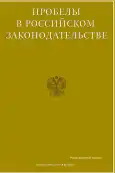Administrative Responsibility for Public Actions Aimed to Discredit the Use of the Armed Forces of the Russian Federation
- Authors: Dugenets A.S.1, Kanunnikova N.G.2
-
Affiliations:
- «Research Institute of the Federal Penitentiary Service» (FKU Research Institute of the Federal Penitentiary Service of Russia)
- North Caucasus Institute for Advanced Studies (branch) of the Krasnodar University of the Ministry of Internal Affairs of Russia
- Issue: Vol 15, No 4 (2022)
- Pages: 219-224
- Section: Articles
- URL: https://journals.eco-vector.com/2072-3164/article/view/531690
- ID: 531690
Cite item
Abstract
Geopolitical processes have a significant impact on the stability of the functioning of any state. The Russian Federation, in the context of the conflict with Ukraine and the conduct of a special military operation in the Donbass, faced a large-scale development of illegal behavior, the basis of which is the misinformation of the population and information manipulation by foreign states. In this context, innovations in terms of regulating administrative and criminal liability for public actions, which are aimed directly at discrediting the process of using the Russian Armed Forces, are important. These innovations are unique and Russian legislation did not contain such norms before. In addition, despite the relatively recent introduction of the relevant norms, by now there is already a very extensive practice of bringing to administrative responsibility for the above-mentioned offense. The purpose of writing the presented work is a comprehensive analysis of administrative responsibility for public actions aimed at discrediting the use of the Armed Forces of the Russian Federation. The author comes to the conclusion about the timeliness of the introduction of administrative responsibility in the above area in the context of emerging challenges and threats to public order and security, as well as the stability of the functioning of the Russian state as a whole. Attention is focused on the fact that the current practice of bringing to responsibility under Art. 20.3.3 of the Code of Administrative Offenses of the Russian Federation is very ambiguous, since, on the one hand, many private actions can indeed be qualified according to the above administrative legal norm, on the other hand, at the moment there are no clarifications from the competent authorities on the specifics of bringing to responsibility for these offenses, which in the future may lead to arbitrariness on the part of law enforcement agencies. In this context, it seems very promising to develop appropriate methodological recommendations in order to exclude unreasonable restrictions on human rights and freedoms.
Full Text
About the authors
Alexander Sergeevich Dugenets
«Research Institute of the Federal Penitentiary Service» (FKU Research Institute of the Federal Penitentiary Service of Russia)
Email: dugenets@rambler.ru
Dr.Sci.(Law), Professor, Honored Lawyer of the Russian Federation, Chief Researcher Moscow, Russia
Natalya Gennadyevna Kanunnikova
North Caucasus Institute for Advanced Studies (branch) of the Krasnodar University of the Ministry of Internal Affairs of Russia
Email: natali6977@yandex.ru
Cand.Sci.(Law), Associate Professor, Head of the State and Civil Law Disciplines Department Nalchik, Russia
References
- Vladimir Putin announced a special military operation in the Donbas // Rossiyskaya Gazeta. URL: https://rg.ru/2022/02/24/vladimir-putin-soobshchil-o-specialnoj-voennoj-operacii-v-donbasse.html (date of access: 04/25/2022).
- Goloviznina Yu.I., Sinkov I.A., Smirnova E.N. On some problematic issues of bringing to administrative responsibility for offenses in the sphere of public order and public safety // Legality and the rule of law. 2021. No. 3 (31). pp. 15-23.
- Two residents of Irkutsk fined under the article on discrediting the Armed Forces of the Russian Federation // Interfax. URL: https://www.interfax.ru/russia/829882 (date of access: 04/25/2022).
- Code of the Russian Federation on Administrative Offenses of December 30, 2001 No. 195-FZ (as amended on April 16, 2022) // Collection of Legislation of the Russian Federation. 2002. No. 1 (part 1). Art. one.
- Lyakhov D.V. Review of legislation in the area of responsibility for fakes and discredit of the Armed Forces of the Russian Federation // Information technologies as a basis for progressive scientific research: collection of articles of the International Scientific and Practical Conference. UFA, 2022, pp. 108-111.
- Poshelov P.V. Novels of the Criminal Code of the Russian Federation on fakes and discrediting the Armed Forces of the Russian Federation // Military Legal Journal. 2022. No. 4. S. 11-13.
- Prosecution for discrediting the use of the Russian armed forces under Art. 20.3.3 of the Code of Administrative Offenses in March 2022 // SOVA: Information and Analytical Center. URL: https://rg.ru/2022/02/24/vladimir-putin-soobshchil-o-specialnoj-voennoj-operacii-v-donbasse.html (date of access: 04/25/2022).
- Khakimova M.R. Actual problems of differentiation of legal responsibility and other forms of legal coercion in the field of administrative law // Law and State: Theory and Practice. 2022. No. 1 (205). pp. 49-52.
- Shenshin V.M. Legal regulation of establishing administrative responsibility for public actions aimed at discrediting the use of the Armed Forces of the Russian Federation in order to protect the interests of the Russian Federation and its citizens, maintain international peace and security // Law in the armed forces - military legal review. 2022. No. 4 (297). pp. 52-59.
- Shutova A.A., Efremova M.A., Nikiforova A.A. Criminal liability for the dissemination of knowingly false information during a pandemic: issues of theory and practice // Bulletin of the Udmurt University. Series: Economics and law. 2021. No. 1. S. 81-89.
Supplementary files











